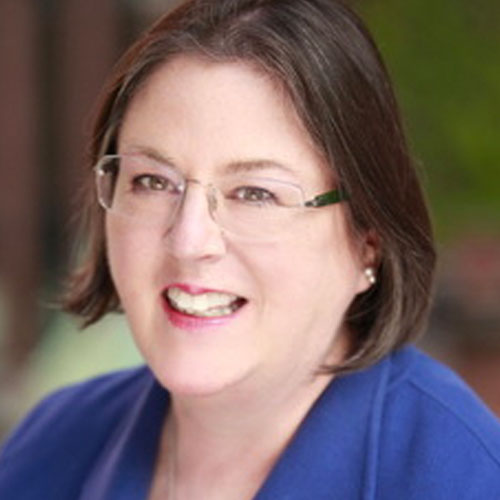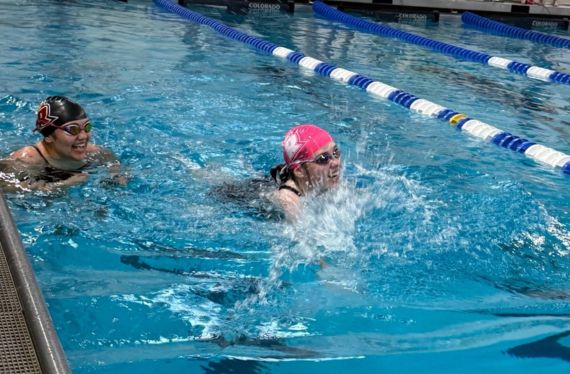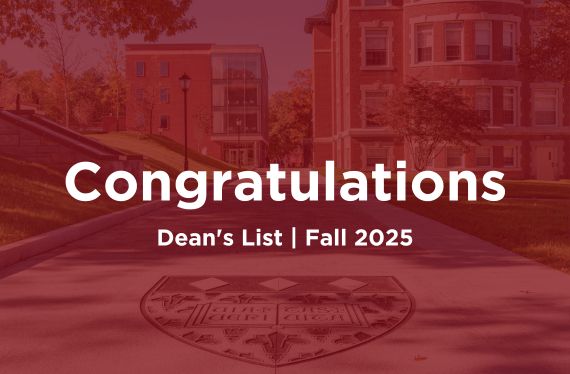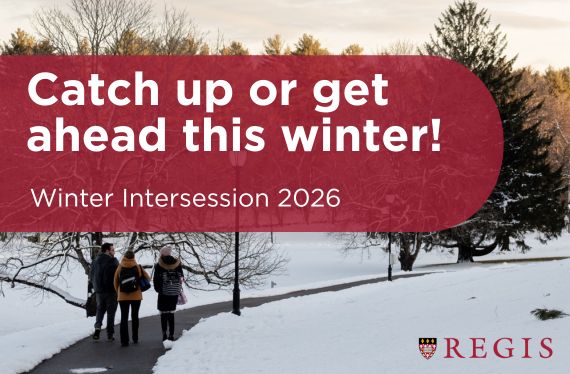Vice President of Academic Affairs Mary Erina Driscoll, PhD, leads the Office of Academic Affairs to provide a vision for the university’s academic programs and facilities—enhancing teaching, research, and the student experience. Read about why she believes it’s important to be a consensus builder who can bring together diverse perspectives and lead through collaboration.
What excites you about joining Regis as vice president of academic affairs?
Although I’ve been very connected to Catholic secondary education for about 30 years, I have not had an opportunity to work professionally in Catholic higher education. I was attracted to Regis because it is very much a mission-driven organization; the commitment to the dear neighbor is real. It is admirable that Regis is trying to craft experiences in its in-person and online communities to bring together individuals who in some ways are different from one another. I see that also as a potential engine of social mobility, and that’s a very important purpose in higher education.

What has it been like starting a new job just as the COVID-19 crisis forced the university to move to entirely online education?
It’s interesting to come into an institution at a crisis moment; and in many ways it’s an opportunity, if you're fortunate, to see an institution at its best. What has been consistently modeled by Regis is a collaborative leadership style where decisions are made and revisited in order to ensure the best outcome. This is more than just the move to online education because COVID has had many ramifications on campus and in our lives.
In many ways the crisis impelled me to action sooner than if I had come at a different time. I may not have had the leisure of reading and studying the job before I was asked to do things, but I’d trade that off for the opportunity to see administration, faculty, staff, and students working at their best day-to-day.
How have the Regis faculty and students adjusted to the change?
I’ve been impressed by the university’s care for the whole person. Students have had a lot of outreach from different people on campus, including faculty members—who are the people they are probably seeing most regularly. There’s also a care for one another among the faculty and staff; people are cognizant of and responsive to other individuals who are going through the crisis outside of their work lives.
I try to build time into every conversation to get to know a little bit about a person, because that’s what you miss by working remotely: the interactions before and after meetings when you're in groups. You have to figure out how to do that because it's so important.
You have a reputation for leading through collaboration, particularly for consensus building. Could you explain more about this approach?
Early in my career when I was working with professor Ken Leithwood [Ontario Institute for Studies in Education], I heard him say to a group: “What makes you think that the quality of your decision is better because you kept more people out of the process?” To me, that was really significant.
When you look at the scope of any decision or action, it’s important to avoid naming the solution before identifying the problem. Different perspectives will bring different problems to the table, and then you can identify which one needs to be focused on right now. There are two things to help promote that kind of collaboration: a willingness to listen and creating a safe space for sharing.
You were among the first women to hold several of your academic roles and you serve on a number of boards. Why is diversity so important when it comes to leadership?
I grew up in parochial schools educated by the Ursuline nuns and then went to a college that was formerly all-women, so I really thought women ruled the world. It was a real surprise to me when I came to the profession of educational administration in the 1980s and realized just how different it was. A majority of teachers were women, but a very small percentage served in leadership roles.
Since then the profession has worked very hard to open doors for underrepresented people—in terms of gender, race, ethnicity, and more recently disability—and I’ve benefited from that. There is such a richness when diversity is embraced.
I did a lot of work early on in my career about community and now I’m really interested in how to create a community of difference and then learn from that in a way that will broaden perspectives. The extent to which we stay with people who look and act the same as us creates an echo chamber; and that’s not what we need today.
What are some of the most important components of academic programming in higher education?
Ideas are our commodity; you have to start with good ideas and transform those ideas and possibilities into a realty. You’re always doing two things simultaneously: learning to respect the depth of disciplinary knowledge—including how interdisciplinary knowledge will help you push limits—and always looking toward the future, skating to where the puck is going to be. Part of that is identifying emerging trends and needs in society. It’s not just about jobs; you’re also responding to the needs of society. That’s at the heart of the mission of Regis.
You can't live through this COVID pandemic and think that there isn't going to be an increasing and diverse need in areas like public health and health sciences. But liberal arts is what trains you to ask questions. The combination of technical skills and critical thinking is at the core of transforming ideas into results.
How does service to others help position graduates to thrive as global citizens?
The COVID pandemic has taught us that barriers and borders are extremely permeable. They don't necessarily constrain us, nor should they. It’s never been more important to be a global citizen, particularly to understand the lived experiences of people who bring something to our perspective that is different from us. We’re not just richer for it, we’re smarter for it.
Service opportunities allow students, faculty, and staff to engage with communities in meaningful ways and in ways that are unfamiliar to us. This is absolutely critical to developing the broad perspective that is needed in a global market.
Why are you so passionate about education?
I come from a family of educators. My grandfather was a master (principal) in the Boston Public School (BPS) system, where he met my grandmother who was a teacher. My father had two sisters who worked in BPS, my mother has a teaching degree that she used for a career in dietetics, and my brother was a teacher. It’s always been a noble profession for me.
One of the great things about higher education in the United States is the number of different kinds of institutions we have. I attended small liberal arts colleges, and worked at a very large private university and medium-sized public universities—most recently as dean of the School of Education at The City College of New York. At this point in my career, it’s a dream to come to Regis: an institution of this size in the Catholic tradition. I’ve learned something at all those other places that will be helpful; but I’ve still got a lot to learn.
What are some lessons you have learned working with college students?
It’s always fun to engage with the students; they are so dedicated and interesting. One of the things I've learned is the amount of influence faculty and staff members have on students. They seek out mentors and adults; and it's important to recognize how significant that is for them. The connection with students is just one of the joys of my work.
What is your biggest professional accomplishment thus far?
I would answer that on two levels. First, being a collaborative, interactive dean at City College and helping leave the institution a little better than when I came in. Second, making a difference to my students: promoting their growth and creating the conditions for them to move ahead. It’s very humbling. As a student, I benefited from people who did that for me.
This pandemic reminds us that life can be fragile; it’s easy for students to become discouraged. So it’s very important to keep reaching out to them. Our connections are much deeper than we recognize.


